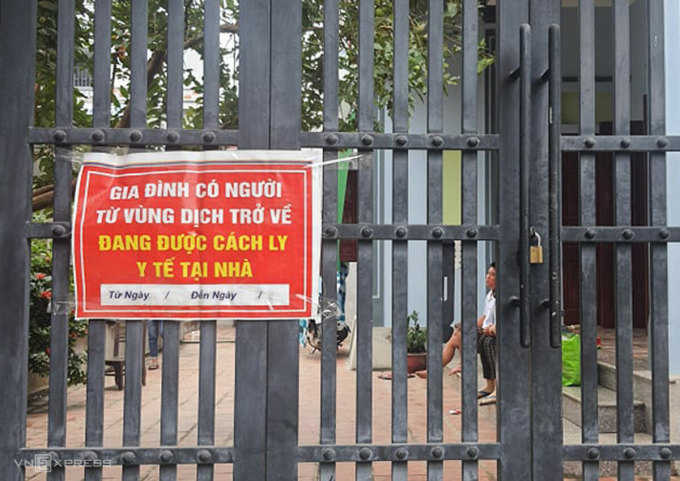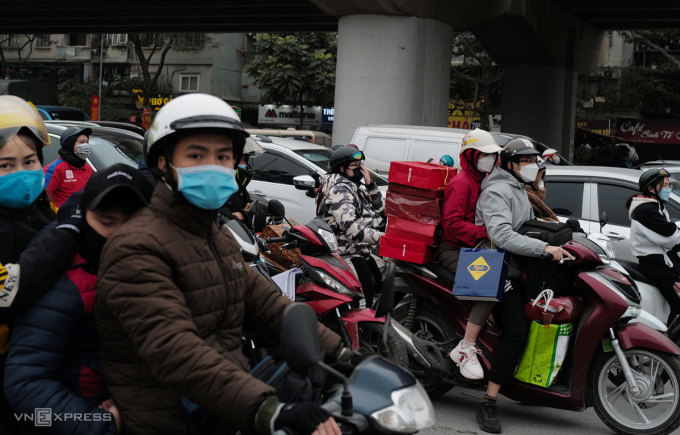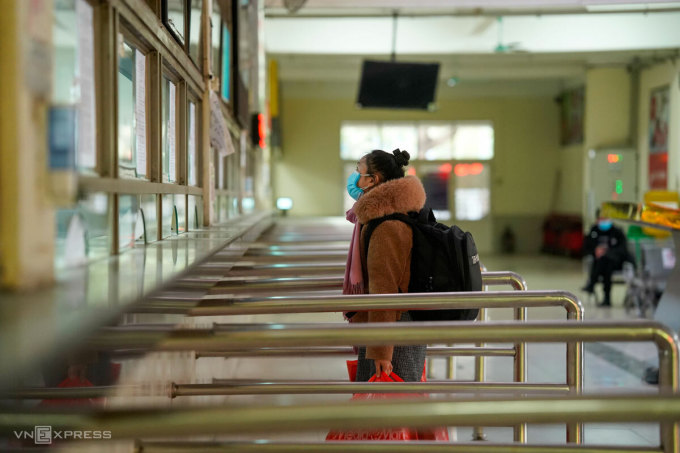Local officials replaced the lock on Nguyen Thi Ly’s house in northern Thanh Hoa Province as her family started seven-day quarantine.
Officials in Thieu Phu Commune in Thieu Hoa District kept hold of the key, with the family able to place a call in case they need anything.
There was a warning sign in front of Ly’s house reading: “There is a family member who has returned from outside the province and is under home quarantine.”
 |
|
Nguyen Thi Ly’s house with the warning sign in front on Jan. 10, 2022. Photo by VnExpress/Hong Chieu |
At the request of the province, the family of three adults and three children self-isolated at home for seven days.
This was the final step in a series of procedures that began with a medical declaration and Covid testing before and after the entire family returned from the low-risk Covid area of Thu Dau Mot Town in southern Binh Duong Province.
“We need to complete the quarantine mandate to be able to celebrate Tet (Lunar New Year),” Ly explained the reason why the entire family returned early on Jan. 9 while the nine-day break for the Lunar New Year begins Jan. 29.
Traditionally during Tet, the country’s biggest and most important celebration, Vietnamese travel in their millions to their hometowns – with many living abroad too making their way back – to be with their families.
However, Covid-19 development and local anti-pandemic regulations have compelled people like Ly to change their usual return date and head home early.
Thieu Phu is a purely agricultural region with a population of nearly 8,400. Of this, more than 2,000 people work elsewhere. Since New Year’s Eve, an average of more than 30 people have returned to the commune every day, primarily from Hanoi and southern provinces.
According to commune leaders, the number of people returning will increase further in upcoming days, so people returning from pandemic-hit areas must be tested at a health facility as soon as they return to their communities.
“The commune does not make it difficult for returnees; the regulations are set out to ensure safety during Tet and also to give the people in the commune peace of mind,” said Trinh Duc Hung, secretary of the Thieu Phu Commune Party Committee.
No one can be certain that people are not exposed to Covid patients or infected on trains and planes returning to their hometowns, he explained.
The commune has recorded 14 positive cases, the majority of which are among people returning home.
There have been cases from low-risk areas where people had received two shots of Covid vaccines, tested negative, but then developed symptoms like coughing and fever and tested positive a few days later.
“I haven’t been to my hometown in eight years,” Ly told her husband a week before returning for Tet.
When Binh Duong Province established industrial parks to welcome the wave of foreign direct investments in the 2000s, Ly and her husband were among the first generation of people who left their commune to head south.
When she saw a large influx of people returning home last October when Covid was better controlled and localities lifted travel restrictions, she also intended to go back, but was afraid of accidentally spreading the virus to the village and decided to stay.
 |
|
People leave Hanoi for their hometown on Dec. 31, 2021. Phtoo by VnExpress/Ngoc Thanh |
After three months of reopening, the “new normal” life does not appear to have returned in Ly’s mind with inns in her neighborhood still largely empty, with only a few workers present.
Years ago, Ly’s family-run grocery store was stocked with sweets and jams, and her family stayed open late to attract customers. But this year, Ly did not bother to import any products.
A week before deciding to return to her hometown, she asked relatives and friends to inquire about Thieu Phu Commune’s quarantine regulations, hoping to learn more from those who had returned.
Knowing she would have to be isolated for a week, she booked a plane ticket for six people and flew out right away, fearing that if cases increased or the anti-epidemic policy changed, the entire family would be unable to celebrate Tet back home. They didn’t even buy gifts in Binh Duong for relatives, fearing people won’t accept them due to Covid concerns.
Her in-laws cooked a tray of dinner and then left their son’s house to stay somewhere else for the time being, leaving the house they were living in as a self-quarantine zone for six people returning from the southern province.
The couple’s youngest daughter, 3, returned to her hometown for the first time, seeing her grandparents standing in the distance, wanting to run to hug her but not daring to. They turned on all the lights in the house outside the alley to get a good look at each other.
“I just follow the guidance from local officials to avoid possible retaliation,” Ly said, despite the fact she had been fully vaccinated and the family tested negative before boarding the plane.
The fact that she can breathe the air of her hometown after decades of working far away is the most rewarding thing for her now. Sometimes Ly’s in-laws called to check on them and to see if the children need anything.
 |
|
A woman at the ticket booth of My Dinh Bus Station in Hanoi before 2022 New Year’s Eve. Photo by VnExpress/Pham Chieu |
Though she also lives far away from her hometown like Ly, Ngoc Ha lives in Ho Chi Minh City’s Binh Chanh District has yet to book a plane ticket for her family to return to her hometown.
The city has been classified as low-risk Covid area, and the restaurant she owns is gradually becoming more crowded. However, this is not the main reason she is unable to decide whether she will return to her hometown to celebrate Tet or not.
She called people in her hometown in Vinh Tuong District, northern Vinh Phuc Province, in early January to inquire about Covid prevention regulations. The commune ordered a seven-day self-quarantine at home. In the most recent order, which was issued on Jan. 11, Vinh Phuc also requested people heading back to the area test negative before returning.
“In the countryside, they don’t care whether you departed from a green zone (Covid low risk) or not. If you agree to follow their mandate, go back; if you don’t, then don’t head home,” she explained.
Ha wishes to pay a visit to her grandmother, who is over 90 years old, since she is unsure how many more New Year’s she will be able to spend with her. The family of three had to cancel their trip to their hometown last year due to a third Covid wave that struck Hai Duong, Quang Ninh, and some northern provinces.
Many communities advised returnees to limit their movement; however, her family had not been immunized at the time, so they decided to stay. If the rules do not change, this could be another Lunar New Year that she won’t be able to spend with her relatives back home.
The local government’s decision has a direct impact on the people’s thoughts and feelings, according to Ha.
Neighbors would be concerned and worried about people living far away when the hometown issued travel advisories and even mobilized returnees to limit heading home. In addition, no one dared to return home during the entire Tet holiday if they had to isolate for seven days.
“Though I have received three jabs, I still haven’t been able to have a normal Tet holiday,” she said. This year, they may still celebrate Tet away from home.
Each locality has issued different epidemic prevention regulations for Tet. Some places require people returning to have a negative test certificate, in addition to encouraging people working far away to limit their return to their hometowns.
Most provinces require people in high and very-high Covid risk areas to self-isolate at home for seven days, while the rest of the regions require seven-day self-quarantine and a medical declaration.
That is how it is at the provincial level, but in many places, the commune-level government still requires seven-day quarantine for people returning home, regardless of whether they came back from low or medium risk areas.
According to Dr. Tran Dac Phu, former director of the Department of Preventive Medicine under the Ministry of Health, the current anti-epidemic policy serves to control potential risks rather than prevent people from heading home.
Provinces must do the right thing by avoiding a pattern that makes life difficult for people in each location. and local governments must create safe conditions for people to return home to celebrate Tet.
Testing should only be done for people who show suspicious symptoms like coughing, fever, shortness of breath, or had made contact with suspected cases, rather than requiring every returnee to do so since it is both costly and subjective.
- Reduce Hair Loss with PURA D’OR Gold Label Shampoo
- Castor Oil Has Made a “Huge” Difference With Hair and Brow Growth
- Excessive hair loss in men: Signs of illness that cannot be subjective
- Dịch Vụ SEO Website ở Los Angeles, CA: đưa trang web doanh nghiệp bạn lên top Google
- Nails Salon Sierra Madre
 VnExpress News The News Gateway of Vietnam
VnExpress News The News Gateway of Vietnam





